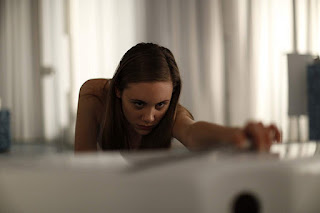Dir - Neil Jordan
Overall: GOOD
Eighteen years after his exceptional adaptation of Anne Rice's Interview with the Vampire, director Neil Jordan returns to similar material by similar means with Byzantium. Just as Interview was scripted by the book's author, Moira Buffini pens her own screenplay here which is based off of her 2008 play A Vampire Story that was turned into a proper novel in 2016. The story combines familiar vampire metaphors with inventive tweaks to the mythos. Here, the undead are transformed not by bite but via a mystical cave which only the terminally ill are granted access to on particular occasions. The main focus is on a mother/daughter team who have lived for centuries on the run, with one of them making ends meet by following "the code" while the other longs to tell her story and be freed from the burden of solemn, emotional isolation. It is one of the more humane depictions of blood-suckers out there who walk freely in sunlight, have no monstrous deformities, and only prey on those whom they share their secret with, revisiting them once they are in old age and therefor ready to die. Primarily a narrative triumph, Jordan still has a keen skill for pacing and elegant visuals even with working within a sub-genre that he had already made his mark in before.
Dir - Justin Benson/Aaron Scott Moorhead
Overall: MEH
For their first of to-date five full-length efforts together, director team Justin Benson and Aaron Scott Moorhead's Resolution works better as an indie buddy comedy than as a thought-provoking Twilight Zone nightmare. Though it apparently takes place in the same cinematic universe as the duo's 2017 film The Endless, said movie's use of topsy-turvy timelines were more prevalent as well as far better utilized than here. Mysterious forces are alluded to yes, but they come off as an underwritten afterthought compared to the central drama revolving around a guy who decides to force his drug-addict best friend to detox. The banter between the two leads is both funny and convincing even if the psychological subtext is pedestrian, thus making the film a successful parody of low-budget character studies. It is a shame that the last twenty minutes suffer the biggest tonal issues and narrative inconsistencies as the freaky elements are left frustratingly vague as they are trying to simultaneously ramp up. Out of nowhere, the two characters that we have been spending the whole ordeal with come to arbitrary conclusions in order to keep the setting grounded until it finishes off on a "Huh?" cliffhanger that is even more random in its execution.
Dir - Mattie Do
Overall: MEH
A DIY debut from Mattie Do, Chanthaly is also allegedly the first Lao horror movie to be directed by a woman, if not the country's first horror film of any kind. A significant work in this respect, it has some impressive attributes for something filmed entirely at a single location, (Do and her screenwriter husband Christopher Larsen's home), and with no obvious production values. Exclusively hand-held camera work and almost no musical score give it an intimate feel, but it is also noticeably the work of a first time filmmaker. Many of the shots are standard, the performances are stiff, the supernatural jolts are cliched, (arbitrary ghost activity such as refusing to talk yet opening their mouths wide, appearing in mirrors for a flash second, and interacting with the living world when the script allows them to), and the mid-range, digital shot quality is cinimatically lacking. These are forgivable criticisms though considering the amateur circumstances by which it was made. The story is an interesting meditation on the acceptance of losing a parent or child, but it is also unfocused, pulling off a nifty yet unsatisfying narrative shift in the final act that raises more questions without profoundly exploring them.









































